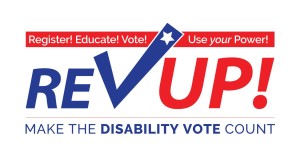When: Thursday, April 14th 2:00 p.m. Eastern
The 2016 presidential election is upon us! Like many nonprofits, you’re excited to help your staff, clients and community members register to vote, but you could you use a few pointers. Nonprofit VOTE is here to help! In this webinar they’ll discuss how to plan and carry out a nonpartisan voter registration drive. Topics will include registration tactics, best practices and messaging that works. RSVP online.
 Voting is a fundamental right, but too many of the voices in our community have been silenced. Of the 37 million eligible voters with disabilities, the participation has been as low as 40%! We urge NCIL members to register to vote, and to help others get registered, too! And we urge Centers for Independent Living to make voting a priority. The REV UP Toolkit can help with those efforts.
Voting is a fundamental right, but too many of the voices in our community have been silenced. Of the 37 million eligible voters with disabilities, the participation has been as low as 40%! We urge NCIL members to register to vote, and to help others get registered, too! And we urge Centers for Independent Living to make voting a priority. The REV UP Toolkit can help with those efforts. Joining in the Not Dead Yet brief are ADAPT, the Association of Programs for Rural Independent Living, the Autistic Self Advocacy Network, the Disability Rights Center, the Disability Rights Education & Defense Fund, Empower Tennessee, the Memphis Center for Independent Living, the National Council on Independent Living, the T.A.R.P. Center for Independent Living, the Tennessee Disability Coalition and United Spinal Association, collectively referred to as the “Disability Rights Amici.” Tennessee attorney Jennifer Lawson handled the filing on behalf of the disability organizations.
Joining in the Not Dead Yet brief are ADAPT, the Association of Programs for Rural Independent Living, the Autistic Self Advocacy Network, the Disability Rights Center, the Disability Rights Education & Defense Fund, Empower Tennessee, the Memphis Center for Independent Living, the National Council on Independent Living, the T.A.R.P. Center for Independent Living, the Tennessee Disability Coalition and United Spinal Association, collectively referred to as the “Disability Rights Amici.” Tennessee attorney Jennifer Lawson handled the filing on behalf of the disability organizations.
